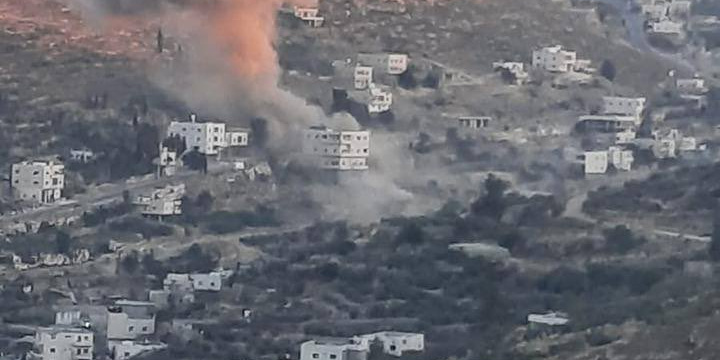A Houthi ballistic missile strike in the Palestinian village of Sa’ir. July 13, 2025. Credit: X/Twitter
On the evening of August 24, the BBC News website published a report by Paulin Kola headlined, “Israel hits Yemen’s Houthis after reports group used cluster bomb” which opens as follows:
Israel has carried out air strikes against Houthi targets in Yemen’s capital, Sanaa, in response to the group’s missile attack on Friday which Israel said carried cluster munitions.
Readers would of course be unlikely to know anything about “the group’s missile attack on Friday” — given that the BBC News website did not provide any coverage of that attack at the time, or in the 50 or so hours before the appearance of Kola’s article about Israel’s response to it.
Neither would BBC audiences be aware of the fact that earlier “on Friday,” the Houthis had also conducted a UAV attack — or that at least seven additional missile or UAV attacks had taken place since the beginning of August (1/8, 3/8, 5/8, 8/8, 12/8, 14/8, 17/8).
Readers wouldn’t know this, because — as we have noted in the past — the BBC generally ignores such attacks, unless Israel responds. And even then, the BBC fails to provide its audience with any sense of the scale of Houthi aggression against Israel, which according to the INSS has now reached over 400 attacks:
Perusal of the BBC News website’s “Houthis” page shows that prior to Kola’s August 24 report, the last three occasions on which audiences found any brief mentions of Houthi attacks on Israel were on June 10 , July 7, and July 10, 2025 — in the first two cases, also following Israeli retaliatory strikes.
Like many of his colleagues before him, Kola tells readers of this report that: [emphasis added]
Since the start of the war between Israel and Hamas in Gaza in October 2023, the Houthis have regularly launched missiles at Israel and attacked commercial ships in the Red Sea and Gulf of Aden, saying they are acting in solidarity with the Palestinians.
The BBC’s serial use of the phrase “regularly launched missiles” of course fails to provide readers with any sense of the scale of those attacks, meaning that they are unable to put reporting about Israeli retaliatory strikes into the appropriate context.
On the topic of the attack on August 22 that used a missile containing cluster munitions, Kola tells readers that:
The Israeli military said the Houthi strike had been the first use of such bombs by the Iran-backed Houthis during the current conflict with Israel, local media and the AP reported.
The Israeli military is reportedly investigating why it was unable to intercept the missile carrying the munitions, which are banned by more than 100 countries. […]
After Friday’s attack, the Houthis released a video showing bombs dispersing mid-air.
The Israel Defense Forces (IDF) told media on Sunday that one such bomblet had landed on the yard of a home in the central Israeli town of Ginaton, causing light damage.
The IDF investigation centres on why the missile delivering the bombs was not intercepted before they had been dispersed, according to Israeli media.
That “light damage” can be seen in a Jerusalem Post report which also includes an account from the daughter of the home-owner.
“Fortunately, our mother heard the alarm and went into the emergency room. We talked while she was there, and she said there was a big boom. When she came out, she saw that the whole house was covered in glass,” Shira told Ynet. “It’s lucky that it fell close and not on the house. She said that the whole house shook, and as you can see, everything is shattered.”
The version of Kola’s report which is currently available online closes by telling readers that:
The [Houthi] rebels are backed by Iran, which Israel said also used cluster bombs during its 12-day confrontation with Israel in June. Iran did not respond at the time to this report.
Interestingly, Kola did not inform BBC audiences that, in addition to the IDF statements concerning Iranian cluster bomb attacks, Amnesty International (which the corporation often quotes and promotes) also put out a report citing three such attacks in June 2025.
Even more remarkable is the fact that the original version of that part of Kola’s report read as follows:
The [Houthi] rebels are supplied by Iran, which also used cluster bombs during its 12-day confrontation with Israel in June.
However, some 11-and-a-half hours later, that paragraph was amended to make it less accurate and informative.
Hadar Sela is the co-editor of CAMERA UK – an affiliate of the Committee for Accuracy in Middle East Reporting and Analysis (CAMERA), where a version of this article first appeared.
Click this link for the original source of this article.
Author: Hadar Sela
This content is courtesy of, and owned and copyrighted by, https://www.algemeiner.com and its author. This content is made available by use of the public RSS feed offered by the host site and is used for educational purposes only. If you are the author or represent the host site and would like this content removed now and in the future, please contact USSANews.com using the email address in the Contact page found in the website menu.






